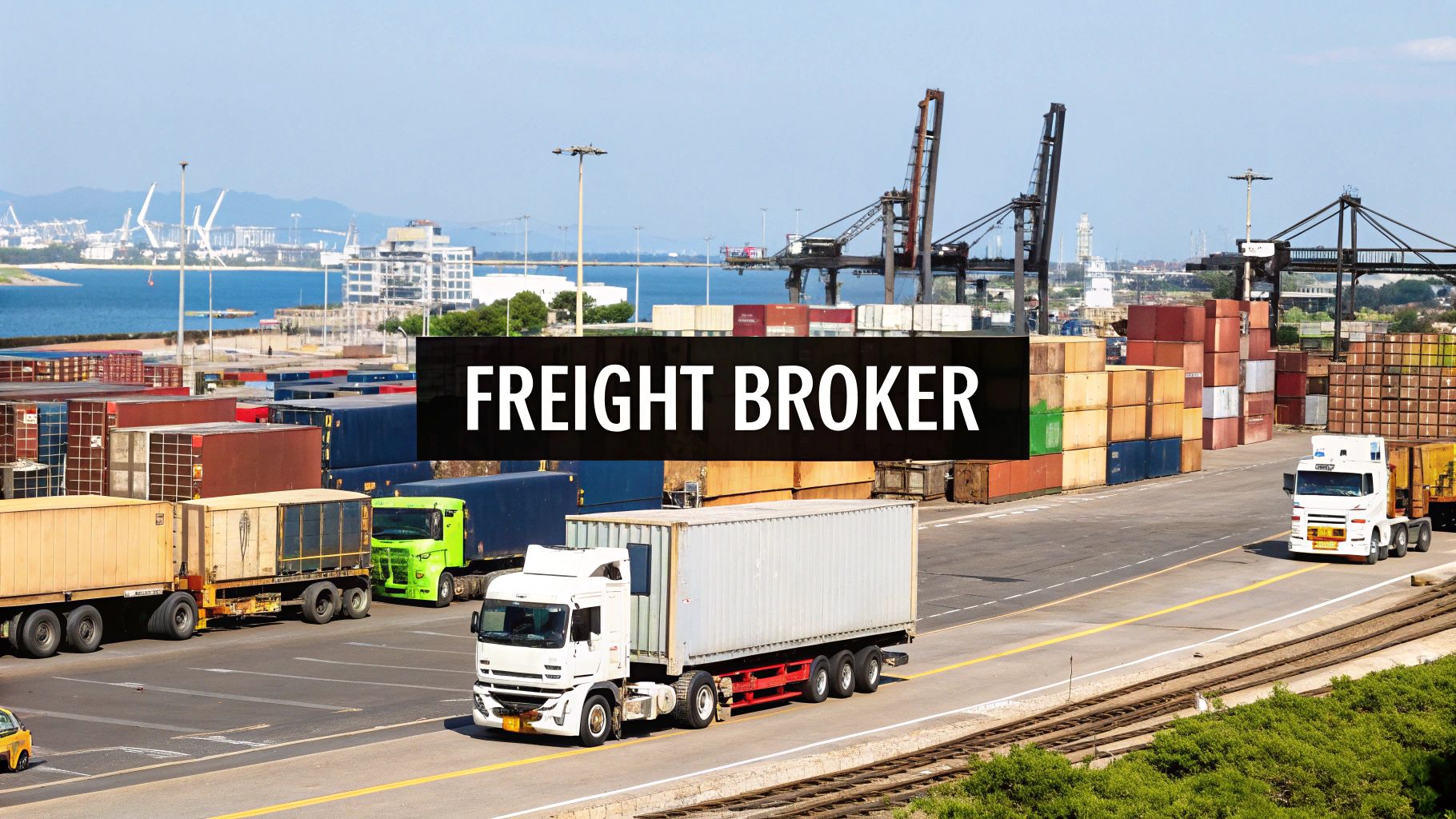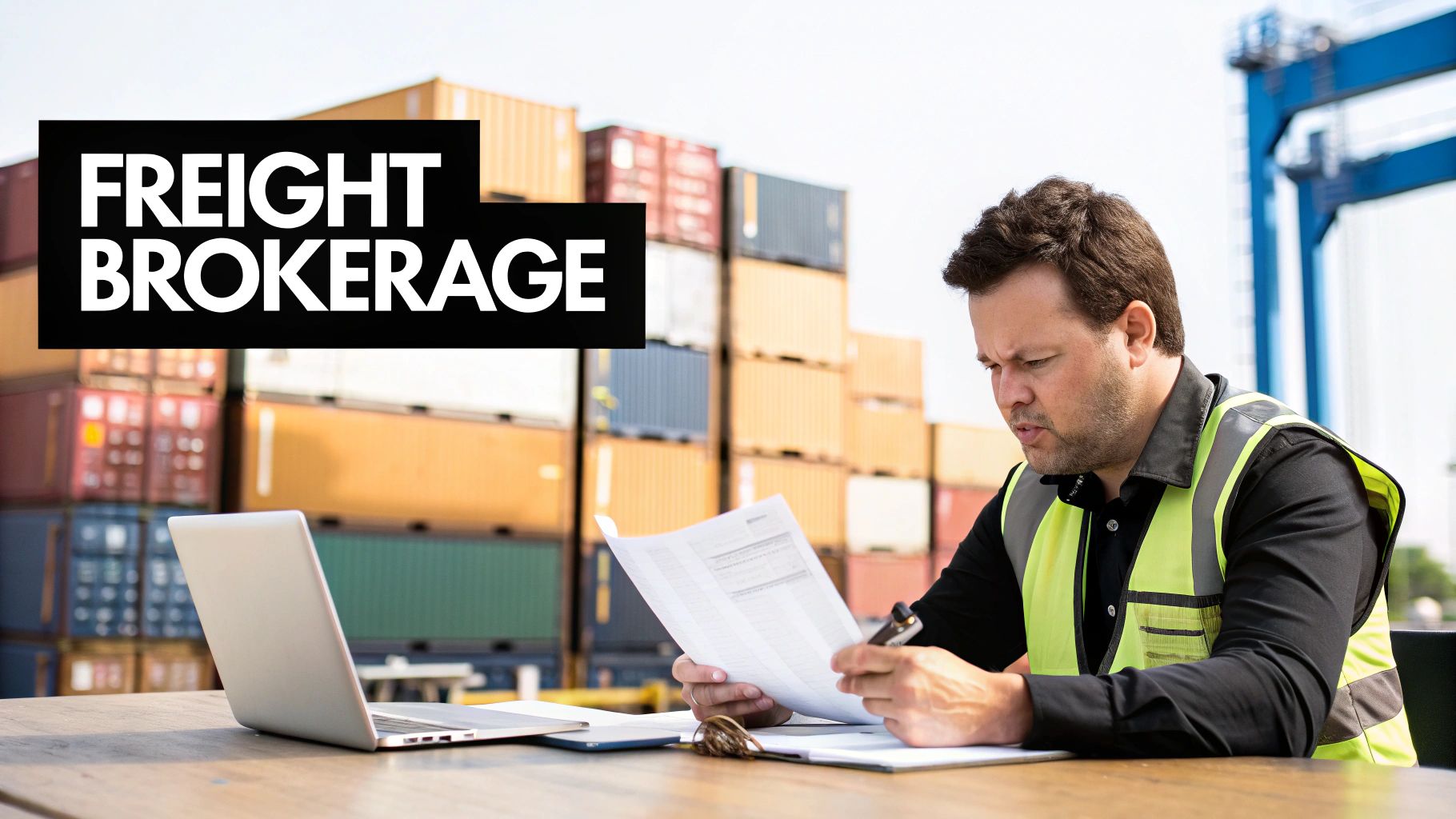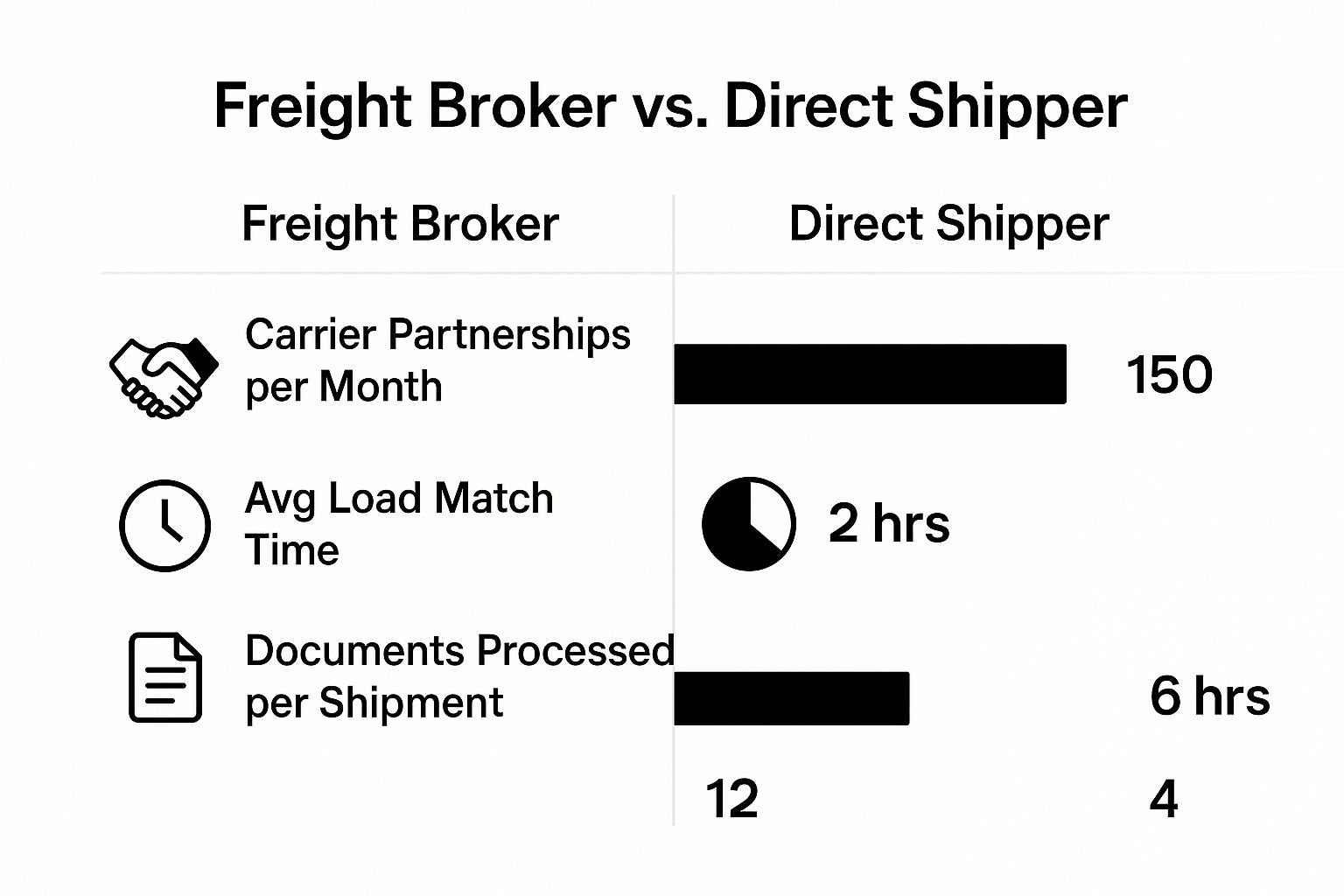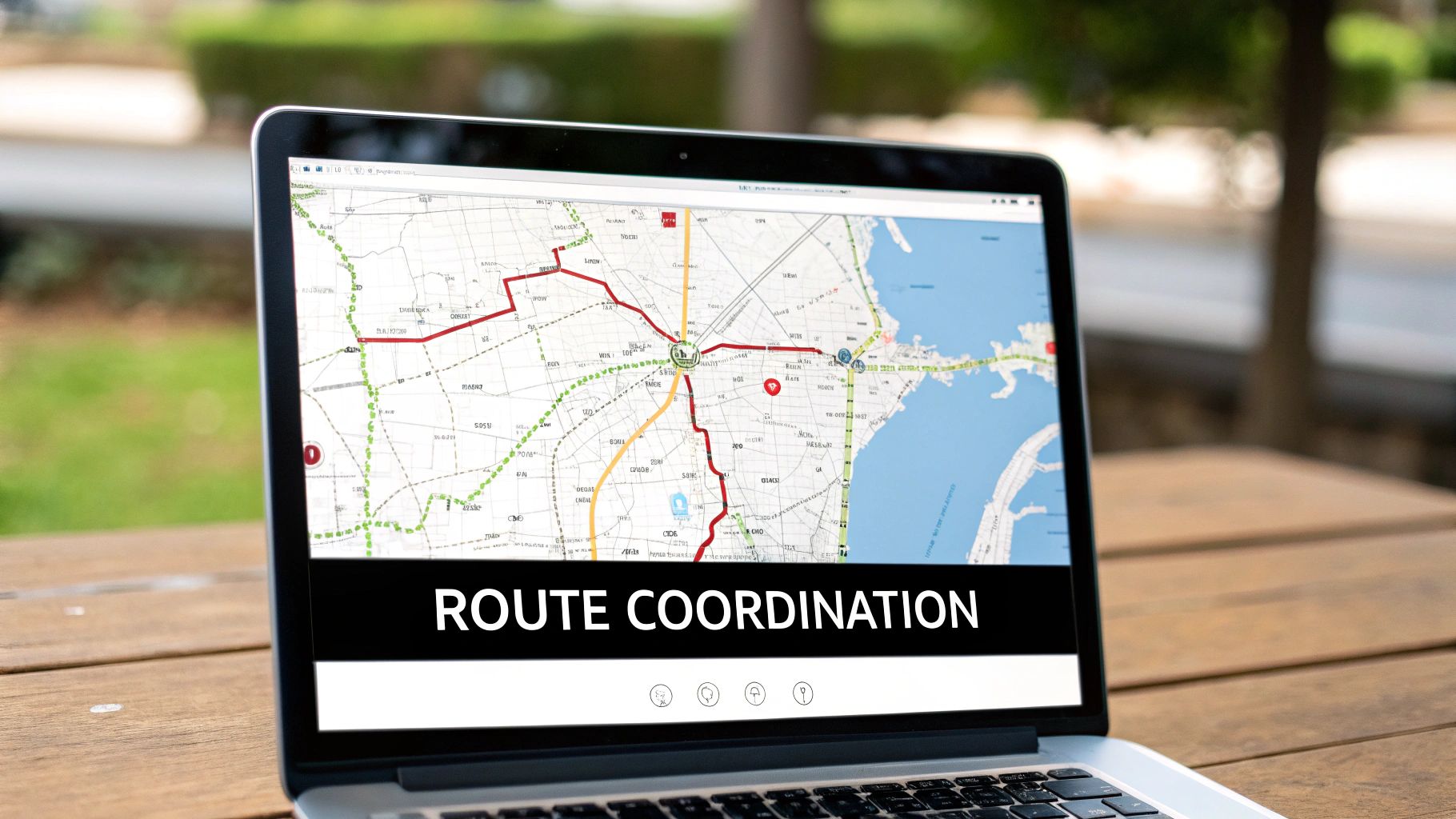Discover the definition of freight broker, their role in shipping, and why they're essential for efficient logistics. Learn more now!

Let's get right to it. A freight broker is the ultimate matchmaker for the shipping world. They're the go-between, connecting businesses that need to move products (we call them shippers) with the trucking companies that can actually haul them (the carriers).
In an industry filled with moving parts, they solve a surprisingly simple yet absolutely critical problem: getting your goods from Point A to Point B safely, on time, and on budget.
The easiest way to think of a freight broker is like a highly specialized travel agent, but for cargo instead of people. When you plan a vacation, a travel agent doesn't fly the plane or run the hotel. Instead, they use their network and expertise to find you the best flights and accommodations.
A freight broker does the same for your shipment. They don't own the trucks, but they have a massive network of vetted carriers and know the ins and outs of the industry. They handle the negotiations, the scheduling, and all the logistical headaches to make sure your freight has a smooth ride.
This role is a linchpin in the modern supply chain. The U.S. freight brokerage market alone was valued at roughly USD 19.68 billion in 2025 and is expected to climb to USD 28.17 billion by 2030. A huge driver of this growth is the e-commerce explosion, which has led to a much higher demand for smaller, more frequent Less-than-Truckload (LTL) shipments. You can dig into more of the numbers in this detailed industry report.
To really get what a freight broker does, it helps to know who they're working with on any given shipment. Every single transaction has three main players, each with a very clear job.
Here’s a quick breakdown of who’s who when a broker gets involved.
As you can see, the broker sits right in the middle, making sure everything runs smoothly for everyone involved.
A great broker essentially becomes your outsourced logistics department, untangling all the complexities of shipping so you don't have to. Their real job is to make the whole process simpler for their client, the shipper.
By acting as the bridge between the shipper and the carrier, the broker keeps communication lines open, handles the back-and-forth on rates, and makes sure all the critical paperwork is in order. This relationship gives the shipper a reliable transportation partner without the massive headache of finding, vetting, and managing carriers on their own.
Ready to see how a broker can simplify your shipping? Get a free, instant quote for your FTL or LTL freight today and let us handle the matchmaking.
So, beyond just playing matchmaker between shippers and carriers, what does a freight broker actually do all day? Their role is far more hands-on than just making a few phone calls. Think of a great broker as your outsourced department, a team of experts managing the daily chaos so you can get back to what you do best—running your business.
Their day is a whirlwind of proactive management and lightning-fast problem-solving. It's a constant juggle of finding and vetting carriers, negotiating rates that work for everyone, keeping an eye on shipments in transit, and tackling the mountain of paperwork that comes with it all. This isn't passive work; it's this active management that stops small hiccups from turning into expensive disasters.

A good broker’s work is never really “done.” From the second you hand off a load, they're on the clock, executing a whole checklist of tasks to make sure everything goes off without a hitch.
The day-to-day work of brokers has a massive ripple effect on the global economy. These experts are the facilitators who keep goods moving, navigating incredibly complex regulations and volatile market conditions.
The global freight brokerage market was valued at a staggering $51.7 billion in 2023 and is expected to climb to $85.9 billion in the near future. Here in the U.S., the trucking industry brought in $940.8 billion in gross freight revenues in 2022 alone, moving an unbelievable 11.4 billion tons of freight. Brokers are the ones coordinating a huge piece of that pie. You can dive deeper into these fascinating trucking industry trends and statistics.
When you boil it all down, a freight broker’s day is dedicated to one thing: providing certainty in a very uncertain industry. They absorb the complexity, manage the risk, and deliver peace of mind.
Their hands-on involvement means you’re not just booking a truck; you’re gaining a dedicated logistics partner who is invested in your shipment’s success from the moment it’s picked up to the second it’s delivered. This commitment is what truly defines a quality freight broker. It’s not about one-off transactions, but about managing a critical part of your business. If you need a partner for your full truckload (FTL) or less-than-truckload (LTL) shipments, get a free instant freight quote and see the difference.
If you're new to the shipping world, you've probably heard the terms broker, carrier, and freight forwarder thrown around. It’s easy to get them confused since they all play a part in getting freight from point A to point B. But their roles are actually quite distinct, and knowing the difference is key to making smart shipping choices for your business.
Let’s try a simple analogy. Think of it like planning a big party.
The carrier is the band you hire. They own the instruments (the trucks), know how to play the music (drive the route), and are the ones who actually perform.
The freight broker is the event planner. They don't own the venue or the sound system, but they have a massive contact list of great bands, caterers, and decorators (carriers). They connect you with the perfect band for your party's vibe and budget, handling all the coordination so you don't have to.
A freight forwarder is more like an all-inclusive wedding planner, especially for a destination wedding. They handle everything from booking the international flights to arranging local transport and making sure all the paperwork (customs) is in order. They take on a much bigger piece of the logistical puzzle, often assuming direct responsibility for the whole event.
This visual really drives home the efficiency a broker brings to the table compared to going it alone.

You can see how a broker’s deep network and specialized focus lead to faster matches and a wider pool of options. It's all about connections and expertise.
To make it even clearer, let's break down exactly who does what in the supply chain. This side-by-side comparison highlights the core differences in their functions, responsibilities, and how they operate.
This table shows that while their goals are similar—moving freight—their methods and legal responsibilities are fundamentally different.
Here's the simplest way to remember it: A broker arranges the ride. A carrier provides the ride. A forwarder manages the entire journey, especially when it gets complicated.
These distinctions become really important with certain types of shipping, like Less-Than-Truckload (LTL). When you're sharing truck space with other shippers, the coordination a broker provides is invaluable. You can dive deeper into this topic in our guide to LTL freight brokerage services.
So, who should you call? It all comes down to your specific needs.
If you have a straightforward domestic shipment, you'll need a carrier—and a broker is the fastest way to find a reliable one at a good price. But if your shipment is crossing borders, involves multiple types of transport, and needs to clear customs, a freight forwarder is likely your best bet. Need a fast price on an LTL or FTL shipment? Get a free instant freight quote today.
Knowing what a freight broker is is one thing, but truly understanding their value in the real world is another. Smart businesses don't just use brokers to move freight; they partner with them to gain a serious strategic edge. It really boils down to three huge benefits: saving a ton of time, cutting shipping costs, and getting instant access to a massive, pre-vetted network of carriers.
Just think about all the hours your team sinks into hunting for available trucks, calling around to different carriers, and haggling over rates. A broker completely takes that off your plate. They become your single point of contact, turning what was once a multi-hour logistical nightmare into a single, straightforward request.

The most obvious win you'll notice is the cost savings. I know it seems odd—adding a "middleman" to save money—but brokers operate on a scale that most individual shippers simply can't match. Their secret weapon is their immense purchasing power.
Because they manage a colossal amount of freight from hundreds or thousands of clients, brokers can negotiate significant bulk discounts from carriers. These are the kinds of rates a business shipping just a few loads a week could only dream of getting on its own.
A broker's value isn't just in the price you pay, but in the costs you avoid. They prevent expensive delays, find capacity during tight markets, and save you the payroll cost of an in-house logistics team.
You'll really see this efficiency shine with more complex shipments. For example, trying to manage multiple less-than-truckload (LTL) freight loads can be a huge drain on your team's time and energy. Our complete guide on LTL freight loads dives into how brokers can consolidate these smaller shipments to get you the biggest savings.
Beyond the bottom line, a broker gives you immediate access to their entire Rolodex of carriers. This is an absolute game-changer, especially when you have an urgent or specialized shipment.
Picture this: you get a last-minute emergency order that absolutely, positively has to ship out today. Finding a reliable, available truck on that kind of notice can feel like mission impossible. A great broker, on the other hand, can tap into their network of thousands of carriers and likely find a solution in minutes, not days. They bring order to the chaos.
Here’s a snapshot of what that network really gives you:
When you partner with a broker, you’re not just hiring someone to make calls. You’re basically plugging in an entire logistics department whose sole purpose is to make your shipping faster, cheaper, and a whole lot less stressful. To see this in action, get a free instant quote for your next FTL or LTL shipment.
Think of a freight broker, and you might picture someone glued to a landline, frantically flipping through a dusty Rolodex. That image couldn't be more outdated. Today, the very definition of a freight broker is being rewritten by technology. It's not about replacing the human touch; it's about amplifying it with digital tools that bring incredible speed, accuracy, and transparency to the table.
This evolution from manual to digital means you get faster service and better outcomes. Forget waiting days for a quote. Now, you can often get one in minutes. This is the new standard, and it's what separates a modern, effective brokerage from one stuck in the past.

So, how does this all work? At the heart of it all is a suite of specialized software designed to automate and fine-tune just about every part of the shipping journey. These aren't just small tweaks; they represent a complete overhaul of how freight is managed. This is how a single broker can oversee hundreds of loads with pinpoint precision.
Here are a few of the key tools you'll find in a modern broker's arsenal:
Curious to see what this tech-driven approach feels like? Get a free, instant quote for your FTL or LTL freight now and experience the difference for yourself.
This technology does a lot more than just make things faster. It delivers a level of insight that was simply unimaginable a decade ago. With a powerful TMS, a broker can give you unprecedented visibility into your supply chain. You can see exactly where your freight is at any moment, get automatic notifications for pickups and deliveries, and pull up all your shipping documents from one clean, simple dashboard.
Technology empowers a great broker to move from being reactive to proactive. Instead of just telling you a shipment is late, they can see a potential delay coming and work to prevent it before it ever happens.
This is where the magic really happens—when smart technology and human experience work together. The software might flag a potential traffic jam or a weather system, and the experienced broker then steps in to reroute the truck or communicate with the driver. This blend of efficiency and expertise leads to faster, more reliable, and ultimately more affordable shipping for your business.
Ready to put this powerful combination to work for you? Get your free instant FTL or LTL freight quote.
So, you see the value a freight broker can bring. The next big question is, how do you find one you can actually trust with your business? Choosing the right partner goes way beyond just hunting for the lowest price. A great broker acts as a guardian for your cargo, your reputation, and your bottom line. A poor one? They can create some seriously expensive headaches.
This isn't a guessing game. It's about knowing what to ask and which boxes to check.
Before you even think about handing over your first load, it’s time to do a little homework. Any broker worth their salt will be an open book and happy to share this information. Think of it as a background check for a critical business partner.
Start with these absolute must-haves:
Ready to work with a fully vetted, trusted broker? Get your free and instant FTL or LTL freight quote now.
Once you’ve confirmed the basics, it’s time to get a feel for how they actually operate day-to-day. Their answers will tell you everything you need to know about the quality of service you can expect.
The real goal here is to find a partner who lives and breathes communication and has rock-solid processes, not just someone who can find a cheap truck. A broker's operational excellence is your best defense against delays and problems down the road.
Get specific and ask about their carrier vetting process. How do they screen new trucking companies for safety and on-time performance?
Find out what their communication looks like. Will you have a dedicated person to call, or will you be routed to a call center?
Finally, ask about their technology. A modern broker should provide a simple online platform where you can get quotes and track your shipments in real time.
Choosing wisely means you’re not just hiring a broker; you’re investing in a partnership that will make your entire supply chain stronger.
Even after you get the basic idea of what a freight broker does, a few practical questions almost always come up. Let's walk through the most common ones so you have a rock-solid understanding of how they work and where their responsibilities lie.
This is probably the number one question we hear, and the answer is refreshingly straightforward. Brokers make their money on the spread—the difference between what the shipper pays them and what they pay the trucking company.
Think of it this way: a shipper agrees to pay a broker $1,500 to get their goods from A to B. The broker then taps into their network and finds a trusted carrier who can do the job for $1,300. That $200 difference is the broker's gross profit. It covers the work of finding the right truck, handling all the logistics, and being the point of contact from start to finish.
Technically, the direct liability for damaged freight falls on the carrier since they’re the ones physically moving it. But this is where having a great broker in your corner is absolutely essential. Their job is to rigorously vet every carrier, making sure they have active and adequate cargo insurance before they ever touch your freight.
When something does go wrong, a top-notch broker steps in to manage the entire claims process for you. They take on the headache of dealing with the carrier's insurance, handling the paperwork, and fighting to get you a fair resolution. In short, they become your advocate.
It might seem like cutting out the "middleman" is the smart move, but it often ends up costing you more in the long run—not just in dollars, but in valuable time. Brokers move a massive amount of freight, which gives them the leverage to negotiate discounted rates that a single shipper just can't get on their own.
Plus, you have to consider the hidden costs. Think about the hours you'd spend searching for a reliable carrier, vetting their authority and insurance, and haggling over rates. For a time-sensitive load, a broker's instant access to a huge network can be the difference between a smooth delivery and a costly delay. Whether you need a quote for an LTL or FTL shipment, get a free instant freight quote and see for yourself.
At FreightQuotesNow, our whole philosophy is built on making shipping simple and affordable. Our experts are always here to answer your questions and match you with the perfect carrier for your specific needs.
Ready to see how much you can save? Get a free instant freight quote for your FTL or LTL shipment.
Article created using Outrank